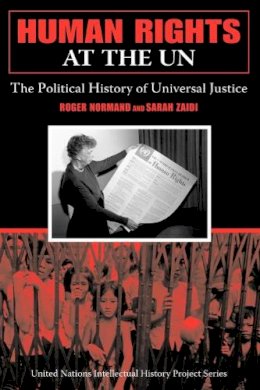Roger Normand is Associate Professor of Law at Lahore University, Pakistan, and co-founder and former executive director of the Center for Economic and Social Rights. He has lectured widely on topics related to international politics and human rights. He lives in Lahore, Pakistan. Sarah Zaidi is Coordinator of Research and Information Systems for Earthquakes–Pakistan and co-founder of the Center for Economic and Social Rights. She lives in Lahore, Pakistan.
"International human rights law is based primarily on Western values and jurisprudence, but strong challenges from Asia and Africa have stimulated a lively debate over the issue. Thankfully, the current cultural gap has been bridged successfully by the team of Normand (Lahore Univ., Pakistan) and Zaidi (Center for Economic and Social Rights), who have produced an illuminating intellectual fusion. The authors carefully examine the historical background prior to WW II, and then distinguish between group and individual rights in the development of UN principles and covenants. They stress the lack of enforcement mechanisms, but praise the UN for giving birth to "the modern human rights regime." Not surprisingly, they blame the Cold War for the evident defects as the US and USSR were both reluctant to accept limitations on sovereignty. The end of the Cold War helped further the UN human rights agenda, but it still "remained dependent on voluntary state compliance with soft norms and policy targets." Normand and Zaidi are strongly critical of recent US policy, thus the latter sections of the book are increasingly polemical, but the authors do clearly announce that they are "human rights activists," not just scholars. Summing Up: Recommended. Upper-division undergraduates and up."—A. Klinghoffer, Rutgers, The State University of New Jersey, Camden, Choice, October 2008 "International human rights law is based primarily on Western values and jurisprudence, but strong challenges from Asia and Africa have stimulated a lively debate over the issue. Thankfully, the current cultural gap has been bridged successfully by the team of Normand (Lahore Univ., Pakistan) and Zaidi (Center for Economic and Social Rights), who have produced an illuminating intellectual fusion. . . . Recommended.October 2008"—A. Klinghoffer, Rutgers, The State University of New Jersey, Camden ". . . Normand and Zaidi have presented a quite readable account of the history of the UN human rights system, mostly providing a perspective on power relations . . . .January 2009"—Klaas Dykmann, H-Soz-u-Kult, H-Net ". . . Zaidi and Normand, both human rights advocates for many years, have prepared a quite critical, readable and highly interesting book. . . January 2009"—History.Transnational "Overall, this volume is extremely well written, organized, and researched, and provides a comprehensive understanding of the development of human rights at the United Nations. September, 2009"—H-NET Reviews Humanities & Social Sciences "Expert and rigorous in methodology, engaging in style, pragmatic yet principled and visionary, this indispensable book is accessible to students, activists, scholars, and practitioners. We all need to understand how and why this system came to be the way it is today if we are to re—appropriate its humane vision and re—enact its humanizing power. —Abdullahi Ahmed A"—Na'im, Emory University School of Law "All who care about human rights need to carefully ponder the challenges that the authors present."—from the foreword by Louis Emmerij, Richard Jolly, and Thomas G. Weiss

